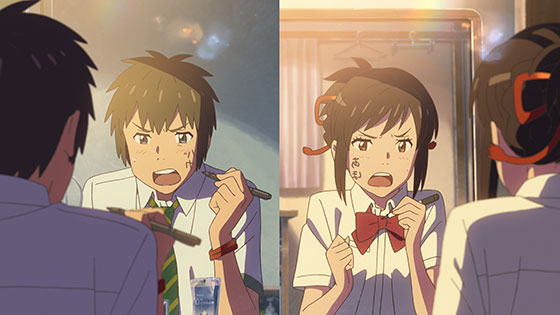Makoto Shinkai talks ‘Your Name’

Your Name is the most remarkable success story in Japanese cinema in the last decade. As of writing, it’s the seventh highest-grossing cinema release in the country’s history, and the fourth highest-grossing Japanese film. And it’s pretty much come from nowhere. While Your Name’s director, Makoto Shinkai, has been making critically acclaimed animated films since 2002, they were modest releases commercially. Your Name has been more than a hundred times as successful, which Shinkai says unnerves him.
An animated romcom and fantasy, Your Name’s two main characters are Taki, a teenage boy who lives in Tokyo, and Mitsuha, a girl who lives in the remote Japanese countryside. Suddenly, these seemingly unrelated youngsters start swapping bodies on random days, so that Taki sometimes wakes up “as” Mitsuha in Mitsuha’s country home, and Mitsuha sometimes wakes up “as” Taki in Tokyo. At first both Mitsuha and Taki are shocked, outraged and very embarrassed; then they start to enjoy their double lives. But then one of them learns the devastating truth behind what’s happening…
Below, Shinkai talks about creating the film…
Your Name seems designed to appeal to a very wide audience. Does it feel less personal to you than your previous films?
This film is what I really wanted to make. But I collaborated with various talented people: Masayoshi Tanaka, the character designer and Masashi Ando, an animator who used to work at Ghibli. [Ando is an Animation Director on Your Name, a role he previously took on Ghibli’s Spirited Away and When Marnie Was There.] That was a really amazing combination, they gave so much depth to my work. And also the music by RADWIMPS, who gave loads of colours to the film, and made it more ‘catchy,’ in a way. It was my first time to do that scale of collaboration, and I owe that to them. But having said that, this film is 100% mine and very personal.
What were some of the biggest changes that the story went through during development?
We had a series of script meetings once a month for six months, with the producer Genki Kawamura and a team in Toho [one of Japan’s biggest film distributors]. I did the script myself, but every month I met up with them and we talked about it, and they would say, ‘This is boring’ or ‘That’s a bit too complicated.’ So I would update everything and meet up again four weeks later.
Kawamura gave me really good suggestions and a fresh perspective about the structure of the film. For example, Your Name starts with Itomori (a mountain town in the country), where the girl Mitsuha lives. Kawamura said, ‘You’ve got to keep (the opening Itomori sequence) within fifteen minutes; any longer will be boring.’ I agreed that was a good idea.
Also we’ve got several climaxes in the movie and two main scenes [in which characters have strange meetings]. Kawamura suggested these two scenes should be in the same frame, that one of them has to come after the other, whereas in my original script these two scenes were separate. So I had really good suggestions from him.
In the film, there is a very elaborate animated fantasy sequence that comes after the boy drinks the sake in the cave. How was that created?
That scene was directed by Yoshitoshi Shinomiya who’s an artist, a classical Japanese painter. Shinomiya has a different perspective on colours and I wanted that scene in Your Name to be different from any other. So I just left it to him; I did the storyboards but the actual direction and art direction was by him. The sequence is only two minutes long. Originally I wanted to make it kind of vague, fantastic, because the film is kind of tense and I wanted the audience to feel a bit relaxed. But Shinomiya gave it more tension, he made it tighter, more powerful. I didn’t expect that but I think the result is really good.
How did you work with the pop group RADWIMPS to create the music for the film?
It was 18 months of collaboration; four vocal tracks and 22 music tracks. RADWIMPS had never done any film soundtracks. I gave them the first script draft and told them to write anything. They came back with several songs; I played them and changed my script accordingly, here and there. I carried on writing the script, went back to them and said, I’ve got this scene, can you change this and that? – and we did that for about 18 months. It was really hard. When we started working, RADWIMPS said to me, ‘Please don’t leave us, we won’t let you down and we want to carry on.’ I thought, ‘Yes, I want to work with them,’ and that was the 18 months. It was a long process but it was really worth it.
[The following quotes come from the public Q&A with Shinkai which followed the British premiere of the film at the London Film Festival.]
Can you describe the dynamic of making the film?
This film has the biggest budget of the films that I’ve made and the biggest staff and a major movie company (behind it). But having said that, the budget was really quite small compared to the budgets of films by Pixar or other major American production companies. A lot of people ask me, because I worked with a major film company (Toho), did the company people tell me what to do?; did they want a happy ending?; did I lose my artistic freedom? But none of that ever happened and I had complete freedom. No-one told me what to do. Your Name is all my creation but I had great suggestions about how to deal with (particular issues).
Which part of the film was the most complicated in terms of production?
Nothing was easy, everything was difficult. I worked with animation creatives who are much older than myself, and had longer careers, so communication with them was quite difficult because I had to pay respect to them. But overall it was fun! What I was thinking is, how to control the 107 minutes of my allocated time? I wanted to take all of you (the audience) on a rollercoaster ride, so how can I control the emotions? I was making a special effort at that. I actually made a feature-length storyboard video (an animatic), with the voices of me and my wife, and music and sound effects, and ‘mapped’ the film before I even started making it.
There’s one sequence early in the film in which shrine maidens dance, which has a very different kind of animation from elsewhere in the film; it’s almost like rotoscoping. How did you achieve that?
I had Ichitaro Nakamura, a kabuki actor, demonstrate that dance to create that scene. I shot the dance (in live-action) and it was close to rotoscoping, we traced everything.
There’s definitely more humour in the film than in your previous work; is that something that you set out to do?
Yes, it’s quite funny to have Mitsuha waking up in the morning and feeling her breasts! As I was creating the story, I just came up with some humorous, fun elements in the story. I really wanted to get every single emotion in this movie, depression, disaster, pleasure… Obviously humour is one of them. And the two main characters are both high-school students, so they are funny, aren’t they? I really wanted to keep that real.
I saw some really interesting traditional Japanese culture in the film. Are you going to engage with this more?
I’m not an expert on Japanese tradition, to be honest. The shrine ritual, for example, actually happens in the countryside in Japan; it’s something I’ve been familiar with ever since I was a child. So I’m not an expert with the cultural elements that you see in the film, but certainly they’re all things that I’m very much familiar with. So this is the Japan that I know: I didn’t expect this film to go round the world, to be honest. So I think there are things (in the film) that if you are a Japanese viewer, you will know and not really ask questions.
Are there any particular concepts or settings that you’d like to explore in future films?
I’ve got a completely blank sheet of paper in front of me about my future. Your Name was a huge and unexpected hit in Japan; I’m supposed to be working on the next movie, but I’m still working on Your Name because of that. One thing I can say is that I’m not going to make a family movie like Hayao Miyazaki. My themes are about teenagers, the pain of growing up, emotions, so I think the next movie will deal with that.
______
Your Name is released in cinemas nationwide 24th November.











































